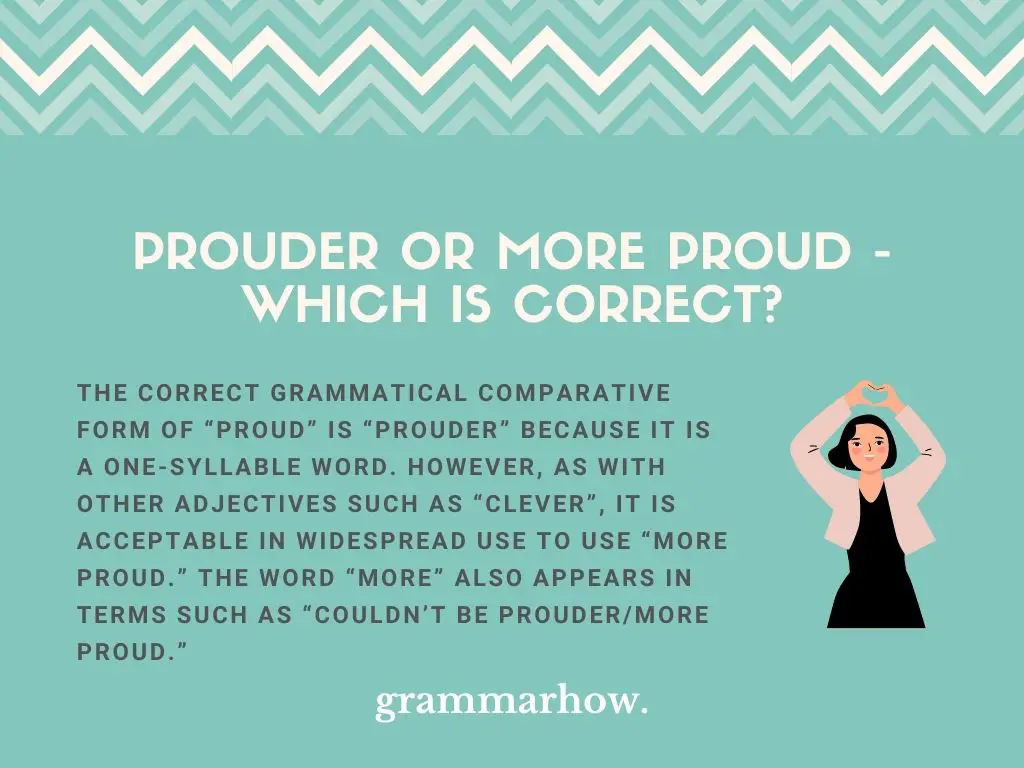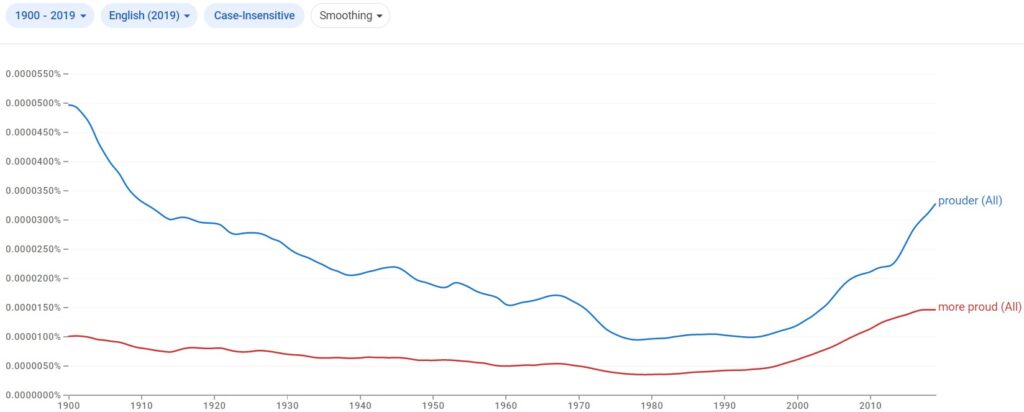Have you ever wondered, “what is the comparative of ‘proud’?” or “ Is prouder a word?”
This page examines the comparative and superlative forms of “proud” and shows the terms in context.
Prouder or More Proud – Which Is Correct?
The correct grammatical comparative form of “proud” is “prouder” because it is a one-syllable word. However, as with other adjectives such as “clever”, it is acceptable in widespread use to use “more proud.” The word “more” also appears in terms such as “couldn’t be prouder/more proud.”

If you are writing a standard text in AP Style, then it is better to use the version found in the Oxford Dictionary, which is “prouder.”
You can also see in the Oxford entry that the superlative form of “proud” is “proudest”, although people also often use “most proud.”
The Google Ngram shows that “proudest” has always been more common, although “more proud” has increased in popularity in recent years.

Here are a few examples that show how the two terms can be used interchangeably:
- I couldn’t be prouder of my son for his results.
- She couldn’t have been more proud after finishing her PhD.
- John was prouder than he had ever been of Mary for finishing her master’s degree.
- I felt more proud when I passed my driving test than when I graduated.
Prouder
According to the Oxford Dictionary, the correct comparative form of “proud” is “prouder.”
The Google Ngram above also shows that “prouder” has always been the most common comparative form worldwide.
Here are some examples of “prouder” in a sentence:
- I couldn’t be prouder of you for finishing the course.
- I left the ceremony feeling prouder than ever.
More Proud
The term “more proud” is an alternative comparative form of “proud.” It is found in some dictionaries, such as the Britannica, but “technically” is not as correct as “prouder” because “proud” only has one syllable.
However, as the Google Ngram above shows, “more proud” has been used for a long time and is acceptable under most circumstances.
Here are some examples of “more proud” in a sentence:
- We couldn’t have been more proud of you for what you achieved.
- You should be more proud of your achievements. Don’t be so humble!
- I couldn’t be more proud of my staff for their hard work and dedication.
Proudest or Most Proud?
The standard superlative form of “proud” is “proudest” because “proud” only has one syllable. However, as with “more proud”, it has become acceptable on most occasions to use “most proud.”
The time when you should avoid using “most proud” is in academic or formal writing. However, for any other purpose, it is relatively standard to see or hear the term “most proud” both in the UK and US.
Here are a few examples of how “proudest” and “most proud” can be used interchangeably:
- She is the proudest mom on her street.
- I felt like the most proud dad in the world when my son made the football team.
Conclusion
The correct comparative of “proud” is “prouder”, and the correct superlative is “proudest.”
However, the terms “more proud” and “most proud” can also be found in dictionaries and are acceptable under most circumstances except in formal writing.

Martin holds a Master’s degree in Finance and International Business. He has six years of experience in professional communication with clients, executives, and colleagues. Furthermore, he has teaching experience from Aarhus University. Martin has been featured as an expert in communication and teaching on Forbes and Shopify. Read more about Martin here.
